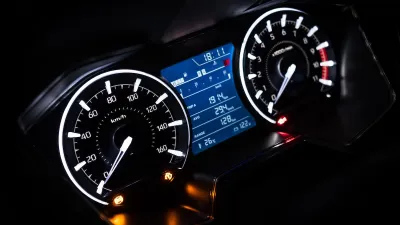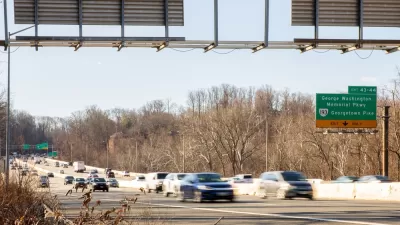A new study in 8 countries says yes, contrary to government predictions.
From the report's abstract, authored by Adam Millard-Ball and Lee Schipper:
"Through decomposing passenger transport energy use into activity, modal structure and modal energy intensity, we show that increases in total activity (passenger travel) have been the driving force behind increased energy use, offset somewhat by declining energy intensity. We show that total activity growth has halted relative to GDP in recent years in the eight countries examined. If these trends continue, it is possible that an accelerated decline in the energy intensity of car travel; stagnation in total travel per capita; some shifts back to rail and bus modes; and at least somewhat less carbon per unit of energy could leave the absolute levels of emissions in 2020 or 2030 lower than today."
Melinda Burns at Miller-McCune writes:
"Most of the eight countries in the study have experienced declines in miles traveled by car per capita in recent years. The U.S. appears to have peaked at an annual 8,100 miles by car per capita, and Japan is holding steady at 2,500 miles."
FULL STORY: A Road Less Traveled

Alabama: Trump Terminates Settlements for Black Communities Harmed By Raw Sewage
Trump deemed the landmark civil rights agreement “illegal DEI and environmental justice policy.”

Planetizen Federal Action Tracker
A weekly monitor of how Trump’s orders and actions are impacting planners and planning in America.

The 120 Year Old Tiny Home Villages That Sheltered San Francisco’s Earthquake Refugees
More than a century ago, San Francisco mobilized to house thousands of residents displaced by the 1906 earthquake. Could their strategy offer a model for the present?

In Both Crashes and Crime, Public Transportation is Far Safer than Driving
Contrary to popular assumptions, public transportation has far lower crash and crime rates than automobile travel. For safer communities, improve and encourage transit travel.

Report: Zoning Reforms Should Complement Nashville’s Ambitious Transit Plan
Without reform, restrictive zoning codes will limit the impact of the city’s planned transit expansion and could exclude some of the residents who depend on transit the most.

Judge Orders Release of Frozen IRA, IIJA Funding
The decision is a victory for environmental groups who charged that freezing funds for critical infrastructure and disaster response programs caused “real and irreparable harm” to communities.
Urban Design for Planners 1: Software Tools
This six-course series explores essential urban design concepts using open source software and equips planners with the tools they need to participate fully in the urban design process.
Planning for Universal Design
Learn the tools for implementing Universal Design in planning regulations.
Clanton & Associates, Inc.
Jessamine County Fiscal Court
Institute for Housing and Urban Development Studies (IHS)
City of Grandview
Harvard GSD Executive Education
Toledo-Lucas County Plan Commissions
Salt Lake City
NYU Wagner Graduate School of Public Service





























